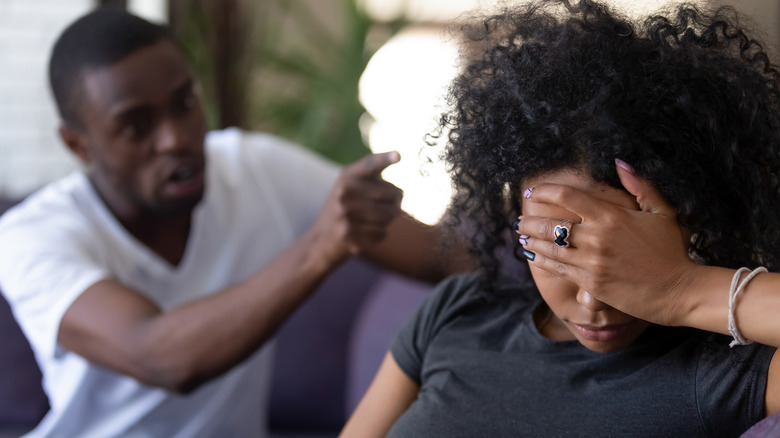Can Trauma Bonding Be Healthy? The Nuances And Warning Signs
If you and someone you love have ever been in a scary situation, it is common to feel closer to them afterward. Whether you were both in the car when you got into a fender bender, or you had to search all night long for your missing friend (only to find out they went home and fell asleep hours ago), you may have uttered the phrase, "Wow, we are totally trauma bonded." We are all guilty of making light of difficult situations at times, but trauma bonding is actually a very serious and unhealthy relationship dynamic.
There is a thin line between love and codependency, and trauma bonding takes it over the edge. Medical News Today defines trauma bonding as "a psychological response to abuse. It occurs when the abused person forms an unhealthy bond with the person who abuses them." Similar to the term Stockholm Syndrome, where victims humanize and stay loyal to their abusers, trauma bonding is a learned behavior that occurs when someone has experienced extremes in their relationship and feels obligated to remain close to their abuser, regardless of the trauma they endure.
Warning signs that you developed a trauma bond
Trauma bonds can be hard to identify because they are easily mistaken as practicing faithfulness or forgiveness. For instance, psychologist Katie Moore Psy.D. told Forbes, "This attachment is not what someone on the outside would expect, and is often looked at by outsiders as an allegiance to one's abuser." Victims of trauma bonding may look for ways to make sense of their traumatic experience and continue to participate in that relationship because they have had positive experiences with their abuser and believe that the abuse isn't from the "real" version of their partner, according to The National Domestic Violence Hotline.
Because trauma bonds form when people experience abuse, the underlying reason is often a dangerous power struggle between an abuser and victim. According to a study in the Journal of Psychiatric Research that focused on domestic abuse survivors, "victims [tended to] develop strong bonds with their perpetrators — a phenomenon known as identification with the aggressor (IWA) — in order to survive the abuse." This relationship forms out of necessity for enduring and normalizing abuse, and therefore will always be an unhealthy dynamic.
Trauma bonding can happen in familial relationships, friendships, and romantic partnerships, according to PsychCentral. It can develop at work; for example, when employees experience severe abuse from their boss but feel obligated to stay at the job because of what their boss seemingly provides them. The common factor in these dynamics is that the person experiencing abuse learns to feel grateful for the trauma because of their reliance on their abusive partner.
Seeking help may be difficult, but necessary
If you have identified multiple traits that align with trauma bonding and still struggle to navigate the aftermath on your own, you could benefit from seeing a therapist. A mental health specialist can help you regain confidence and remind you of your identity outside of your relationship. It may take time, just as it did to develop the trauma bond, but a professional will help you gain a perspective that has been lost within an unhealthy relationship dynamic. They may also help you identify if the relationship can be salvaged or if you should end things for your own health and happiness.
It can be extremely difficult to seek out therapy when you are in a dangerous relationship where trauma bonding has occurred. Your partner may see your attempts at seeking professional help as you looking for a way out of your relationship. They may become more possessive and controlling, which could lead to violence. "Please seek guidance on how to leave safely, as the process of leaving can also be dangerous," said Katie Moore Psy.D. to Forbes. In the case where you or someone you love is unable to attend therapy while in a relationship, there are domestic abuse hotlines, shelters, and services available to help victims safely leave their dangerous environment.
If you or someone you know is dealing with domestic abuse, you can call the National Domestic Violence Hotline at 1−800−799−7233. You can also find more information, resources, and support on their website.


